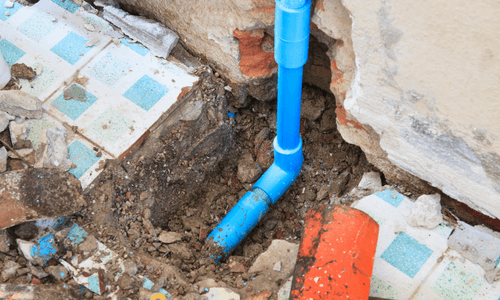
5 Signs Your Pipes Should Be Replaced
The plumbing system is a critical component of any home, responsible for delivering clean water and removing wastewater efficiently. Over time, pipes can deteriorate due to age, corrosion, and other factors, leading to various issues that may necessitate replacement. In this comprehensive guide, Local Plumber will discuss five common signs that indicate your pipes should be replaced.By recognizing these signs early on, homeowners in Sarasota, FL, and beyond can take proactive measures to address potential plumbing problems and ensure the integrity of their plumbing system (Pipes Should Be Replaced).
1. Persistent Leaks:
Persistent leaks in a home’s plumbing system are a clear indication that the pipes may need to be replaced. While occasional leaks can often be repaired, frequent or recurring leaks suggest underlying issues with the integrity of the pipes. Over time, pipes can deteriorate due to corrosion, rust, and wear and tear, leading to cracks, holes, or joint failures that result in leaks.Persistent leaks pose several problems for homeowners, including water damage, mold growth, and increased utility bills due to wasted water. Even minor leaks can cause significant damage to walls, ceilings, and flooring if left unaddressed, leading to costly repairs and renovations.
Addressing persistent leaks typically involves replacing the affected pipes to restore the integrity of the plumbing system. A professional plumber can assess the extent of the damage and recommend the appropriate course of action, which may include replacing individual sections of pipe or upgrading the entire plumbing system to modern materials that are more resistant to corrosion and wear.
By addressing persistent leaks promptly and replacing deteriorating pipes as needed, homeowners can prevent further water damage and maintain the reliability and efficiency of their plumbing system for years to come.
2. Low Water Pressure:
Low water pressure in a home’s plumbing system can indicate the need for pipe replacement. Over time, pipes can become clogged or restricted due to mineral deposits, sediment buildup, corrosion, or damage, leading to decreased water flow and pressure at fixtures such as faucets, showers, and toilets.Persistent low water pressure can be a frustrating and inconvenient problem for homeowners, affecting everyday tasks such as showering, washing dishes, and doing laundry. While temporary fluctuations in water pressure may be normal, severe or persistent issues often indicate underlying problems with the pipes.
Addressing low water pressure typically involves diagnosing the cause of the problem and taking appropriate corrective action. In many cases, this may require replacing the affected pipes to restore proper water flow and pressure throughout the home. A professional plumber can conduct a thorough inspection of the plumbing system to identify the source of the low water pressure and recommend the most effective solution, which may include replacing outdated or deteriorating pipes with modern materials that promote better water flow and performance.
By addressing low water pressure promptly and replacing pipes as needed, homeowners can improve the functionality and efficiency of their plumbing system, ensuring a reliable supply of water for their household needs.
3. Discolored Water:
Discolored water in a home’s plumbing system is a concerning sign that may indicate the need for pipe replacement. The presence of rust, sediment, or other contaminants in the water can cause it to appear brown, yellow, or rusty in color, indicating corrosion or deterioration of the pipes.Discolored water poses several risks and concerns for homeowners, including potential health hazards from ingesting or using contaminated water, as well as aesthetic issues such as stained fixtures, laundry, and dishes. Additionally, discolored water may indicate the presence of harmful substances such as lead or copper leaching from deteriorating pipes, posing long-term health risks if left unaddressed.
Addressing discolored water typically involves identifying the source of the contamination and taking corrective action to restore water quality. In many cases, this may require replacing the affected pipes to prevent further leaching of contaminants into the water supply. A professional plumber can conduct water quality testing and inspect the plumbing system to determine the extent of the problem and recommend appropriate solutions, which may include replacing aging or corroded pipes with modern materials that are less prone to corrosion and contamination.
By addressing discolored water promptly and replacing deteriorating pipes as needed, homeowners can ensure a safe and reliable supply of clean water for their household needs.
4. Strange Noises:
Strange noises coming from a home’s plumbing system, such as banging, clanging, or rumbling sounds, can indicate underlying issues with the pipes that may necessitate replacement. These noises, often referred to as “water hammer” or “pipe chatter,” occur when water flow is disrupted by loose or damaged pipes, causing them to vibrate, rattle, or strike against surrounding surfaces.Persistent or loud noises in the plumbing system can be disruptive and alarming for homeowners, indicating potential problems such as loose fittings, worn-out washers, or deteriorating pipes. Ignoring these noises can lead to further damage to the pipes and plumbing fixtures, as well as increased risk of leaks, water damage, and structural issues.
Addressing strange noises typically involves identifying the source of the problem and taking corrective action to stabilize or replace the affected pipes. A professional plumber can conduct a thorough inspection of the plumbing system to determine the cause of the noises and recommend appropriate solutions, which may include securing loose pipes, replacing worn-out components, or upgrading outdated pipes with modern materials that minimize vibration and noise.
By addressing strange noises promptly and replacing deteriorating pipes as needed, homeowners can prevent further damage to their plumbing system and enjoy a quieter, more efficient home environment.
5. Age of Pipes:
The age of a home’s plumbing pipes is a critical factor to consider when assessing whether they should be replaced. Most plumbing materials have a finite lifespan, and older pipes are more susceptible to corrosion, rust, and deterioration over time. Aging pipes may be made from outdated materials such as galvanized steel, copper, or polybutylene, which can become brittle, corroded, or weakened with age.As pipes age, they are more prone to developing leaks, clogs, and other issues that can compromise the integrity and functionality of the plumbing system. Additionally, older pipes may contain lead or other hazardous materials that pose health risks to occupants if they leach into the water supply.
Replacing aging pipes is often necessary to ensure the reliability and safety of the plumbing system. A professional plumber can conduct a thorough inspection of the pipes to assess their condition and recommend the most appropriate course of action. This may involve replacing individual sections of pipe, upgrading to modern materials, or installing a completely new plumbing system, depending on the extent of the deterioration and the homeowner’s preferences.
By replacing aging pipes before they fail, homeowners can prevent costly repairs, water damage, and health hazards associated with deteriorating plumbing infrastructure, ensuring the long-term reliability and efficiency of their home’s plumbing system.
Conclusion
Recognizing the signs that your pipes should be replaced is essential for maintaining the integrity and functionality of your home’s plumbing system. By addressing issues such as persistent leaks, low water pressure, discolored water, strange noises, and aging pipes, homeowners can avoid costly repairs, water damage, and health risks associated with deteriorating plumbing infrastructure. If you notice any of these signs in your home, don’t hesitate to contact a professional plumber for a thorough inspection and recommendations for pipe replacement. With proactive maintenance and timely intervention, you can ensure the long-term reliability and efficiency of your plumbing system.Contact us today for any plumbing issues and we shall be at your service. Email us at services@local-plumber.com or call us at 813-776-7667 (POOP).





Leave a comment